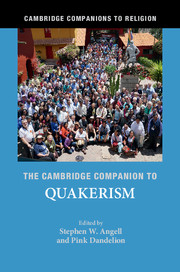Book contents
- The Cambridge Companion to Quakerism
- Cambridge Companions to Religion
- The Cambridge Companion to Quakerism
- Copyright page
- Dedication
- Contents
- Contributors
- Introduction
- Part I History of Quaker Faith and Practice
- Part II Expressions of Quaker Faith
- Part III Regional Studies
- Part IV Emerging Spiritualities
- 14 Unprogrammed Quaker Spiritualities
- 15 Quakers and Non-theism
- 16 Evangelical Quakerism and Global Christianity
- 17 Convergent Friends
- 18 Intra-Quaker Ecumenism
- References
- Index
- Cambridge Companions to Religion (continued from page ii)
- References
18 - Intra-Quaker Ecumenism
Women’s Reconciling Work in the Pacific Northwest and Kenya
from Part IV - Emerging Spiritualities
Published online by Cambridge University Press: 06 April 2018
- The Cambridge Companion to Quakerism
- Cambridge Companions to Religion
- The Cambridge Companion to Quakerism
- Copyright page
- Dedication
- Contents
- Contributors
- Introduction
- Part I History of Quaker Faith and Practice
- Part II Expressions of Quaker Faith
- Part III Regional Studies
- Part IV Emerging Spiritualities
- 14 Unprogrammed Quaker Spiritualities
- 15 Quakers and Non-theism
- 16 Evangelical Quakerism and Global Christianity
- 17 Convergent Friends
- 18 Intra-Quaker Ecumenism
- References
- Index
- Cambridge Companions to Religion (continued from page ii)
- References
Summary
- Type
- Chapter
- Information
- The Cambridge Companion to Quakerism , pp. 328 - 347Publisher: Cambridge University PressPrint publication year: 2018



